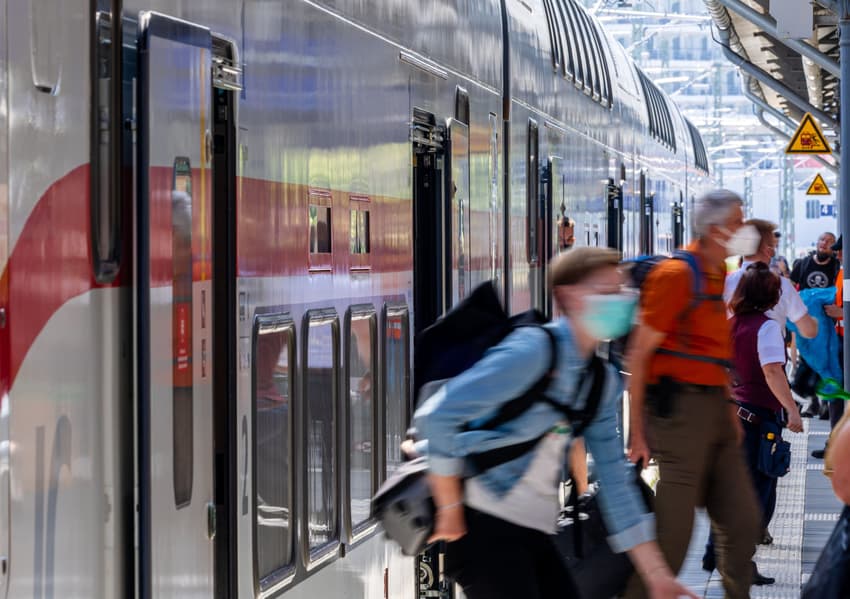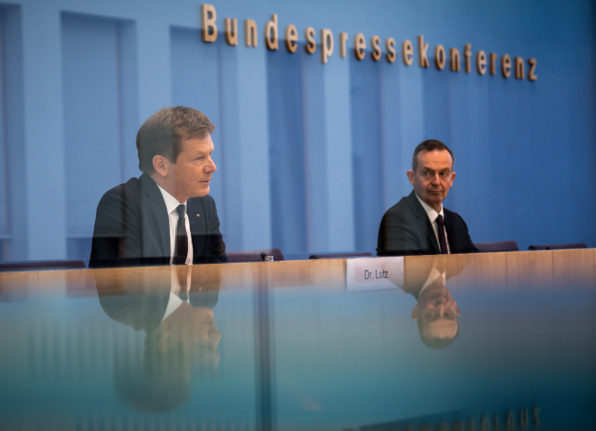How Germany plans to make trains more punctual

Germany's largest rail operator Deutsche Bahn has announced plans to upgrade parts of its network to enable faster trains and fewer disruptions.
The work on Germany's over-stressed rail network is scheduled to begin in 2024 and will target the sections of the track that are most desperately in need of renovation.
This will cover the busiest section of the rail network, comprised of some 3,500 kilometres or 10 percent of Germany's railway track.
This includes a stretch of the railway track between Hamburg and Hanover, between Dortmund and Cologne, Würzburg and Nuremberg, Karlsruhe and Basel and routes to and from major cities like Stuttgart, Frankfurt am Main and Munich..
Announcing the move on Wednesday afternoon, Transport Minister Volker Wissing (FDP) said the changes would put a stop to the endless delays that have become a regular feature of travelling with Deutsche Bahn.
"I expect that in future we will be able to set the clock by the railways again," Wissing said.
READ ALSO:
- REVEALED: The best night trains running through Germany
- How to explore Germany by train with the €9 ticket
The Transport Minister said years of "political neglect and underfunding" were to blame for the fact that parts of the rail network had reached "their absolute limits". The worst-affected parts of the track are currently running at 125 percent of their current capacity, leading to regular delays and disruptions.
"It cannot remain as it is," he said. "I want to tackle the problems by making them a top priority."
Wissing said countermeasures would now be taken, including the bundling of construction measures, an increase in efficiency and more customer-friendly construction planning.
Badly outdated infrastructure
Increasing demand combined with outdated infrastructure and construction activities currently lead to "traffic jams and delays with massive effects on all customers", explained Deutsche Bahn CEO Richard Lutz, who appeared alongside Wissing at a press conference on Wednesday.
"The current operational quality clearly does not meet our standards."
The problem is only set to get worse over the coming years, Lutz said, with an additional 9,000 kilometres of track likely to be overburdened by rail traffic by 2030. Passenger numbers are expected to double by then amid efforts to transition from cars and planes to more eco-friendly modes of transport.
Lutz previously spoke out about the issues with the ailing network in May this year. At the time, he said DB would miss its punctuality target of 80 percent in long-distance traffic and would end up "significantly" below it.
READ ALSO: ‘We’re running late on this’: Deutsche Bahn promises better Wifi on German trains by 2026
The punctuality of German trains has taken a nosedive this year, with just 62.7 percent of long-distance trains arriving within five minutes of the scheduled time.
Just under 80 percent of ICE, EC and IC trains are delayed by less than 15 minutes - which means a whopping one in five trains leaves passengers waiting for more than a quarter of an hour.
Speaking out about the issues with the rail network, Lutz said delays were increasing and that there was currently a record number of construction sites on stretches of the track.
Many switches and signal boxes are outdated and prone to breakdowns, he said.
Three criteria for renovation
In the future, rail bosses want to take three new criteria into account in the planned general renovation.
First, regional construction work will be bundled together in order to keep sections of track free of construction sites for several years.
Secondly, equipment upgrades and other modernisations will be carried out at the same time as standard repairs in order to ensure that busy stretches of track have a "first-class standard of equipment".
Thirdly, more emphasis will be placed on "customer-friendly" construction in the future.
READ ALSO: EXPLAINED: How to find cheap train tickets in Germany

Transport Minister Volker Wissing (FDP) and Deutsche Bahn CEO Richard Lutz speak at a press conference in Berlin on June 22nd. Photo: picture alliance/dpa | Michael Kappeler
Commenting on the plans in an interview with Tagesschau, SPD politician and former train driver Detlef Müller voiced scepticism about the plans.
"We hear announcements like this every year," he said. "We're the world champions when it comes to announcing targets. Now we have to implement them."
The €9 ticket proves that people want to travel by train and bus, Müller stressed. But he said the ticketing system in Germany should be simpler.
"It's not about price, whether it costs €9 or €19," he said. "The important thing is that you have a ticket in your pocket, you get on and you get off.
"It doesn't matter what zone I'm in, whether it's A, B or C, what the time period is, whether I'm allowed to take a bike or a dog, where the tariff zone ends - none of that matters.
"The main thing is, they get on, they get off. It has to be simple."
READ ALSO: EXPLAINED: Deutsche Bahn’s new ticket rules for 2022
Comments
See Also
The work on Germany's over-stressed rail network is scheduled to begin in 2024 and will target the sections of the track that are most desperately in need of renovation.
This will cover the busiest section of the rail network, comprised of some 3,500 kilometres or 10 percent of Germany's railway track.
This includes a stretch of the railway track between Hamburg and Hanover, between Dortmund and Cologne, Würzburg and Nuremberg, Karlsruhe and Basel and routes to and from major cities like Stuttgart, Frankfurt am Main and Munich..
Announcing the move on Wednesday afternoon, Transport Minister Volker Wissing (FDP) said the changes would put a stop to the endless delays that have become a regular feature of travelling with Deutsche Bahn.
"I expect that in future we will be able to set the clock by the railways again," Wissing said.
READ ALSO:
- REVEALED: The best night trains running through Germany
- How to explore Germany by train with the €9 ticket
The Transport Minister said years of "political neglect and underfunding" were to blame for the fact that parts of the rail network had reached "their absolute limits". The worst-affected parts of the track are currently running at 125 percent of their current capacity, leading to regular delays and disruptions.
"It cannot remain as it is," he said. "I want to tackle the problems by making them a top priority."
Wissing said countermeasures would now be taken, including the bundling of construction measures, an increase in efficiency and more customer-friendly construction planning.
Badly outdated infrastructure
Increasing demand combined with outdated infrastructure and construction activities currently lead to "traffic jams and delays with massive effects on all customers", explained Deutsche Bahn CEO Richard Lutz, who appeared alongside Wissing at a press conference on Wednesday.
"The current operational quality clearly does not meet our standards."
The problem is only set to get worse over the coming years, Lutz said, with an additional 9,000 kilometres of track likely to be overburdened by rail traffic by 2030. Passenger numbers are expected to double by then amid efforts to transition from cars and planes to more eco-friendly modes of transport.
Lutz previously spoke out about the issues with the ailing network in May this year. At the time, he said DB would miss its punctuality target of 80 percent in long-distance traffic and would end up "significantly" below it.
READ ALSO: ‘We’re running late on this’: Deutsche Bahn promises better Wifi on German trains by 2026
The punctuality of German trains has taken a nosedive this year, with just 62.7 percent of long-distance trains arriving within five minutes of the scheduled time.
Just under 80 percent of ICE, EC and IC trains are delayed by less than 15 minutes - which means a whopping one in five trains leaves passengers waiting for more than a quarter of an hour.
Speaking out about the issues with the rail network, Lutz said delays were increasing and that there was currently a record number of construction sites on stretches of the track.
Many switches and signal boxes are outdated and prone to breakdowns, he said.
Three criteria for renovation
In the future, rail bosses want to take three new criteria into account in the planned general renovation.
First, regional construction work will be bundled together in order to keep sections of track free of construction sites for several years.
Secondly, equipment upgrades and other modernisations will be carried out at the same time as standard repairs in order to ensure that busy stretches of track have a "first-class standard of equipment".
Thirdly, more emphasis will be placed on "customer-friendly" construction in the future.
READ ALSO: EXPLAINED: How to find cheap train tickets in Germany

Commenting on the plans in an interview with Tagesschau, SPD politician and former train driver Detlef Müller voiced scepticism about the plans.
"We hear announcements like this every year," he said. "We're the world champions when it comes to announcing targets. Now we have to implement them."
The €9 ticket proves that people want to travel by train and bus, Müller stressed. But he said the ticketing system in Germany should be simpler.
"It's not about price, whether it costs €9 or €19," he said. "The important thing is that you have a ticket in your pocket, you get on and you get off.
"It doesn't matter what zone I'm in, whether it's A, B or C, what the time period is, whether I'm allowed to take a bike or a dog, where the tariff zone ends - none of that matters.
"The main thing is, they get on, they get off. It has to be simple."
READ ALSO: EXPLAINED: Deutsche Bahn’s new ticket rules for 2022
Join the conversation in our comments section below. Share your own views and experience and if you have a question or suggestion for our journalists then email us at [email protected].
Please keep comments civil, constructive and on topic – and make sure to read our terms of use before getting involved.
Please log in here to leave a comment.